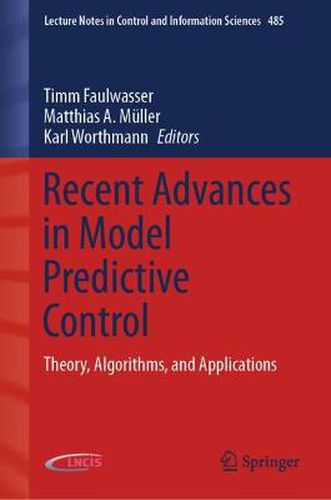Readings Newsletter
Become a Readings Member to make your shopping experience even easier.
Sign in or sign up for free!
You’re not far away from qualifying for FREE standard shipping within Australia
You’ve qualified for FREE standard shipping within Australia
The cart is loading…






This title is printed to order. This book may have been self-published. If so, we cannot guarantee the quality of the content. In the main most books will have gone through the editing process however some may not. We therefore suggest that you be aware of this before ordering this book. If in doubt check either the author or publisher’s details as we are unable to accept any returns unless they are faulty. Please contact us if you have any questions.
This book focuses on distributed and economic Model Predictive Control (MPC) with applications in different fields. MPC is one of the most successful advanced control methodologies due to the simplicity of the basic idea (measure the current state, predict and optimize the future behavior of the plant to determine an input signal, and repeat this procedure ad infinitum) and its capability to deal with constrained nonlinear multi-input multi-output systems. While the basic idea is simple, the rigorous analysis of the MPC closed loop can be quite involved. Here, distributed means that either the computation is distributed to meet real-time requirements for (very) large-scale systems or that distributed agents act autonomously while being coupled via the constraints and/or the control objective. In the latter case, communication is necessary to maintain feasibility or to recover system-wide optimal performance. The term economic refers to general control tasks and, thus, goes beyond the typically predominant control objective of set-point stabilization. Here, recently developed concepts like (strict) dissipativity of optimal control problems or turnpike properties play a crucial role.
The book collects research and survey articles on recent ideas and it provides perspectives on current trends in nonlinear model predictive control. Indeed, the book is the outcome of a series of six workshops funded by the German Research Foundation (DFG) involving early-stage career scientists from different countries and from leading European industry stakeholders.
$9.00 standard shipping within Australia
FREE standard shipping within Australia for orders over $100.00
Express & International shipping calculated at checkout
This title is printed to order. This book may have been self-published. If so, we cannot guarantee the quality of the content. In the main most books will have gone through the editing process however some may not. We therefore suggest that you be aware of this before ordering this book. If in doubt check either the author or publisher’s details as we are unable to accept any returns unless they are faulty. Please contact us if you have any questions.
This book focuses on distributed and economic Model Predictive Control (MPC) with applications in different fields. MPC is one of the most successful advanced control methodologies due to the simplicity of the basic idea (measure the current state, predict and optimize the future behavior of the plant to determine an input signal, and repeat this procedure ad infinitum) and its capability to deal with constrained nonlinear multi-input multi-output systems. While the basic idea is simple, the rigorous analysis of the MPC closed loop can be quite involved. Here, distributed means that either the computation is distributed to meet real-time requirements for (very) large-scale systems or that distributed agents act autonomously while being coupled via the constraints and/or the control objective. In the latter case, communication is necessary to maintain feasibility or to recover system-wide optimal performance. The term economic refers to general control tasks and, thus, goes beyond the typically predominant control objective of set-point stabilization. Here, recently developed concepts like (strict) dissipativity of optimal control problems or turnpike properties play a crucial role.
The book collects research and survey articles on recent ideas and it provides perspectives on current trends in nonlinear model predictive control. Indeed, the book is the outcome of a series of six workshops funded by the German Research Foundation (DFG) involving early-stage career scientists from different countries and from leading European industry stakeholders.